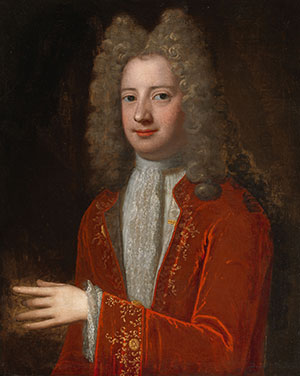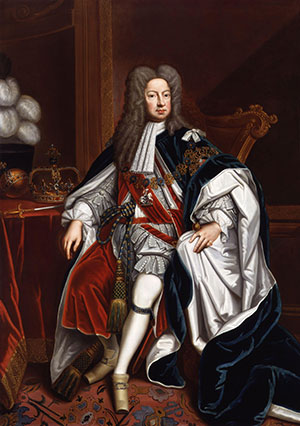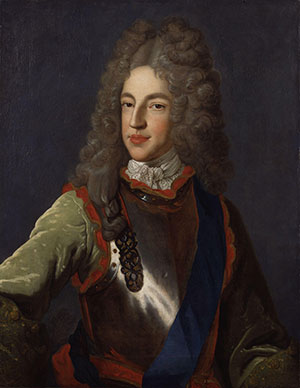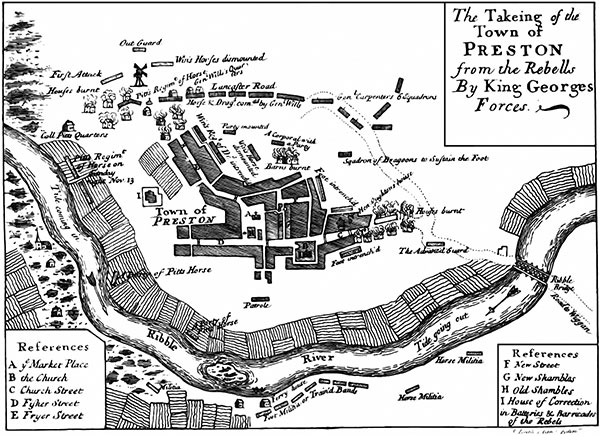Poems from the prison yard—a poetic correspondence between Charles Wogan and William Tunstall
Published in Features, Issue 2 (March/April 2017), Volume 25In 1716 Grant’s publishers of Pater Noster Row, London, circulated Poems of love and gallantry, which contained a composition by Charles Wogan of Rathcoffey, Co. Kildare
By Richard Maher

Above: ‘Chevalier’ Charles Wogan—during the winter of 1715/16 he awaited trial for treason in London’s Newgate Prison. (NGI)
Relaxed conditions of confinement

Above: ‘German George’—in the autumn of 1715, Wogan had been in Northumbria promoting rebellion against the newly crowned King George I of Great Britain and Ireland. (NPG)
William Tunstall

Above: The ‘Pretender’, James III—Wogan finally escaped to France in June 1716, where he re-entered James’s service as a special agent.
I.
From me, dear Charles, inspired with ale,
To thee this letter comes,
To try if scribbling can prevail
To moderate our dooms:
Tho’ pent in cage the blackbird swings,
Yet still he hops, and struts and sings.
With a fa, la, la, la, etc.
III
But since, though bound, on Barnet Tits,
So lately we astride,
Through hired shouts of wide-mouthed cits,
Without a rein to ride:
Sure Pegasus, without a bit,
To opinioned poets may submit.
With a fa, la, la, la, etc.
VIII
For now, dear Charles, (my freedom gone)
This prison seems my wife,
I no man see to aid my moan,
Hear nought but noise and strife:
For (after all that can be said)
A gaol’s a kind of being wed.
With a fa, la, la, la, etc.
IX
Now I this tale to thee have told,
(And nothing can be worse)
That I this gaol, must have and hold
For better and for worse:
Judge then, how bravely I shall quit
This marriage noose for Tyburn twit.
With a fa, la, la, la, etc.
The tune to which the lines are set is of interest in itself. It is attributed to Charles Sackville, sixth earl of Dorset, who composed it at sea on 13 June 1665 on the eve of the Battle of Lowestoft between the English and Dutch fleets during the second Anglo-Dutch War. The song bears the spirit of contemporary balladry, with its rousing melody, rhythm and refrain. The commander of the English fleet on that occasion was none other than James Stuart, duke of York, who would later be crowned King James II. The result of the battle was a great victory for the duke over the forces of his nephew (and future son-in-law) Prince William of Orange, the Dutch stadtholder. The two would later face each other in July 1690 on the banks of the River Boyne. It would become a point of great anger among many of his Irish supporters that James displayed none of his earlier prowess on that fateful day. This might partly explain the apparent lack of enthusiasm in Ireland for the insurrection of 1715. Nevertheless, Charles Wogan and William Tunstall had pinned their hopes to the Stuart cause and they both awaited trial for treason.
Wogan’s response
Wogan’s poetic response to Tunstall was to the same tune and so is structurally in keeping with the lines, although Wogan’s do not exhibit the same literary flare and skill. It seems that the Northumbrian gentleman’s experience and learning outshone those of Wogan. The response was dedicated to the ‘ladies about court and town’ and reminds them that, though they are imprisoned, the prisoners’ hearts are still theirs to dispose of as they please!
I
You fair ones all at liberty,
We captive lovers greet,
Nor slight our tears and sighs, cause we
Can’t lay ’m at your feet:
The fault’s not ours, and you may guess
We can desire no greater bliss.
With a fa, la, la, la, etc.
V
Thus we’ll to the innocent and fair,
That shun indecent sights,
From purchased shouts and noisome air,
To whispers and delights:
Then all our pains shall pleasures prove,
And pinioned arms be wings of love.
With a fa, la, la, la, etc.
VI
But if our stubborn keepers still
Should chain us in our dens,
In disobedience to your will
And sovereign influence:
Spite of their shackles, bolts and doors,
Our hearts are free, and they are yours.
With a fa, la, la, la, etc.
XI
Nay, should we victims be designed
By those that rule the state,
Should mercy no admittance find,
To hearts that now be great:
What dread can gaols or gibbets show
To men who’ve died so oft for you.
With a fa, la, la, la, etc.
Wogan chastised
Tunstall’s playfully indignant response chastised Wogan for his willingness to lay himself at the feet of the ladies of court and town. Was it not enough for him to be in prison without also being bound to women’s affections? Tunstall uses the technique of pathetic fallacy to draw the similarity between his studied distance from women and that of the River Thames, ‘sleeping in his bed of ice’, undisturbed by the troubles of the fair. It seems that Tunstall in his older age considered himself securely entrenched against the folly of young love.
IV
Thy flame, amidst cold walls, survives,
No moment’s care neglects,
And even, when thou’rt dead, contrives
To please the female sex:
Thy unextinguished Sparks shall burn,
And Nymphs possess thee in thy urn.
With a fa, la, la, la, etc.
V
Yet, trust me Charles, when thou was led
A captive through the street,
Those females only came to invade,
And finish thy defeat!
Of all their conquered charms bereft,
Now glad to plunder what is left.
With a fa, la, la, la, etc.
IX
With hoary age all fenced around,
Secure entrenched I lie,
And sixty years still staunch are found
Against love’s artillery;
And thus encamped like Northern Hosts,
I safely rest in snows and frosts.
With a fa, la, la, la, etc.
X
Thus jolly Thames, that used to bear
Upon his curled breast,
The charming burdens of the fair,
Who seldom gave him rest:
Now, indolent, and free from vice,
Sleeps undisturbed in his own ice.
With a fa, la, la, la, etc.
Dramatic escape
The significance of the poetry may lie not in the perfection of its form or style but rather in the inherent value it must have held for those who wrote and received it. Sung aloud, no doubt it warmed their spirits in the damp and cold of winter. One must remember that both Wogan and Tunstall were charged with treason, a burden under which many would despair, since it tended to result in execution. When some of the leaders of the rebellion met that fate in the spring of 1716, Wogan and his companions in Newgate turned their thoughts to cheating the hangman’s noose. Late on 4 May 1716 they seized their opportunity, rushing the guards, ‘wrenching muskets and bayonettes out of their hands’ and dashing out into the darkened streets of London. Wogan narrowly avoided detection over the subsequent weeks before finally escaping to France in June 1716, where he re-entered the service of James III as a special agent. The cost of his escape from Newgate would soon be bitterly counted by George I, as Wogan would go on to secure (in the most dramatic style) a highly advantageous marriage alliance between James III and Princess Maria Clementina Sobieska. Together they produced a successor to the royal Stuart line, Charles Edward Stuart, better known as Bonnie Prince Charlie of the 1745 insurrection. In the aftermath of that final flicker of the Jacobite flame, Charles Wogan reflected that he had lost his rights to his family’s ancestral seat at Rathcoffey ‘through the wildness of my youth’. In the end, his poetry outlived his cause, and his staunch loyalty and valour in support of the Stuarts went largely unrewarded.

Above: ‘The Taking of the Town of PRESTON from the Rebells By King Georges Forces’—where Wogan was captured in November 1755. (Preston Digital Archive)
Richard Maher lectures in Dublin Institute of Technology.
FURTHER READING
T. Canavan, ‘Making a hole in the moon: the rescue of Princess Clementina’, History Ireland 1 (4) (1993).
D. Defoe, The history of the Press Yard (London, 1717).
R. Patten, The history of the rebellion in the year 1715 (London, 1745).
Poems of love and gallantry, written in the Marshalsea and Newgate by several of the Preston prisoners (London, 1716).
















